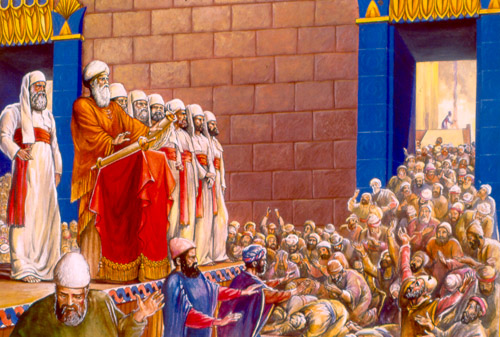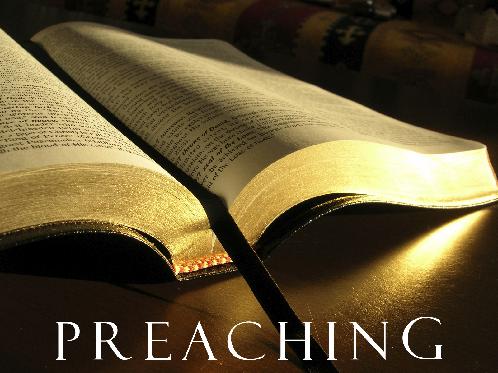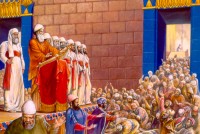Does Nehemiah 8:8 when Ezra read from the law and explained the meaning provide us with a biblical model for preaching? I think not. Read on to find out why.

Summary of Nehemiah 8
In Nehemiah 8, the people of Israel gather in Jerusalem to hear Ezra read from the book of the Law of Moses. They did this on the first day of the seventh month, and Ezra read the law from morning until midday (8:2-3). Verse 8 is often referenced as giving instruction on how to preach. The verse says that first the law was read, and then someone gave the sense of the reading to help the people understood what was read.
Though this is often used as a great example of how to preach, what Ezra did in this text is not at all similar to modern preaching.
Why Nehemiah 8:8 is Not a Model Sermon
First of all, the reason for the reading and explaining of the law was because most of the Israelites had never heard it before (Neh 8:14). They were biblically illiterate. Second, this time of teaching was not a weekly event, but was a daily event, which lasted for three or four hours every morning, for seven days in a row (Neh 8:3, 18). For one week the people gathered in the morning to hear the Law read and explained, and then in the afternoon, they would eat, drink, and celebrate (8:10-12).
Aside from all of this, it is highly debatable about what form the teaching took. According to Nehemiah 8:7, numerous priests were involved. Most assume that these priests took turns teaching from the Law, but it is also possible that they had something like a panel discussion. Either way does not look like our modern practice of one person who does all the talking.
Reading the Law
The procedure of this event, according to 8:8, began by reading the Law of Moses. Does this mean that over the course of the week, they read through all five books of the Pentateuch, or does it mean just Leviticus? Did they read through it chapter by chapter, or did they approach it topically? We just don’t know.
How much did they read at one time? Who read it? Did they take turns? There is much about this reading that is uncertain, and so once again, we cannot equate it with the practice of reading a verse or two (or ten) before a sermon on Sunday morning.
Giving the Sense
Beyond the reading of the text, Nehemiah 8:8 says that they also gave the sense of the text. What does this mean? Most equate this with the modern form of preaching, where the pastor explains what the text means and then provides some illustrations and application.
While this is possible, it is not likely. The Law was written in Hebrew, and since all of this generation of Israelites had never been in Israel before, but had recently returned from Babylon, the vast majority probably did not speak Hebrew. So to “give the sense” means that after the Law was read in Hebrew, the priests translated it into the spoken language of the Israelites. It is possible that some additional explanation was provided by one or more of the priests, but the text just does say.

If We Followed Nehemiah 8:8
So if a church wanted to follow the pattern of Nehemiah 8, the first thing they would need to do is have the pastor stop preaching every week. Instead, the church should host an annual “Preach and Party” where for seven days the morning is reserved for studying a book of the Bible, and the afternoon for eating, drinking, and having fun together.
The form of the preaching would be to gather several pastors up front, and begin with one of them reading from the Bible in Greek or Hebrew. Then what was read must be translated into English, and possibly, if desired, the text can be explained.
After the week was over, people would go home with the expectation that they put into practice the things they had learned that week.
Have you ever seen this sort of preaching done in churches today? While you might occasionally see pastors refer to the Greek or Hebrew, the passage is almost never read completely in Greek or Hebrew, and then translated and explained, and even in the rare church that does do it this way, it is never performed by a panel of preachers, and never for just seven days in a row and then not at all the rest of the year, and never followed by a daily feast and party.
Frankly, this approach might benefit a lot of people and churches today. The people might learn more, the pastors would only preach in conjunction with other pastors, and only for one week out of the year, and every day would conclude with a big party. Many churches might really thrive from such a practice. I would love to see it happen.
But whatever we get from Nehemiah 8, we do not find a pattern for the modern practice of preaching where one person gets up once a week for thirty to forty minutes, and gives a sermon.




You also don’t tend to get many parties following on from contemporary sermons with the pastor telling you to go have a good time and a slap-up meal! (Nehemiah 8:9-12)
The Nehemiah passage isn’t indicative of “normal” practice, being a special “covenant-renewal” occasion. I think some churches do an annual covenant-renewal service, so maybe that is the closest parallel. Weekly worship is not quite the same occasion, in my view, although of course we are remembering our covenant. Like you said, they were quite likely translating (as the NIV footnote to verse 8 suggests) as they didn’t understand the Hebrew, having been in exile for more than a generation.
I like that covenant renewal idea. I didn’t know some churches do this. Which type of churches?
I’ve come across (but never attended) Methodists doing a covenant service each new year. (e.g. see http://www.methodist.org.uk/index.cfm?fuseaction=opentogod.content&cmid=1926)
Okay, here’s the beef though.
You can see a conjunction between the Synagogue and a rabbi doing his thing and a modern church with a pastor (hate that word) doing his thing. Nehemiah 8 is doing something that the Jews became accustomed to as they developed Synagogue out of necessity, because they could not go back to Jerusalem to temple worship. Having a guy stand up and explain the scriptures who is learned.
So maybe your right, this is not how we are supposed to do it, but Jesus did participate in Synagogue and used his rabbinical status to speak at Synagogue. Paul did also.
I think we could say this one man speaking is inferior to Temple worship, but we need to keep in mind that this non scriptural practice was given Messianic and Apostolic Precedent and was the forerunner to the NT church we are trying to get back to. In post exile Judaism, it now had the acceptance of one guy speaking about the scriptures.
Now we know that the NT church really had more participation in it, because they had tongues and prophets speaking, but real early church history (I mean within a hundred years) refers to Presidents who presided over services.
One more thing to put out here before I pull all of this together. I have been listening to Frank Viola on the internet publicly speak. You know, for a house church guru, he is one of the best preachers I have ever heard. Don’t tell him that, it may break his heart!
There seems to be place for a leader to expound upon God’s Word. Going back to Moses the OT prophets, the NT prophets, and the Evangelist like Timothy and Titus. They key though is that the expounding on scripture had to meaty, it had to have “BEEF”. It was not milk, it was solid food.
The modern problem we have is a passive audience that just sits there. Maybe we can have one guy speak, if others got do more also. Maybe preaching is not the problem as much as how not to make the preacher the focus, but rather what he is talking about.
Johnny,
EXCELLENT point, and I will be talking some about the teaching style of Jesus, especially in regard to the synagogue and Rabbinical teaching, in a future post.
In large part, I will end up agreeing with you.
Maybe the evolution of the church over synagogue was that “one man sit down, and then another speak”
Well, Organic Church preaching does have people interacting, almost like a sunday school class, with a blackboard, etc.
But I remember about 7 or 8 years ago I went to a pastor’s meeting, and the guy running gave an entire lesson on how the entire book of Nehemiah was about leadership. Each chapter has a seperate point (12 in total I think) about how you should lead the sheep. He wrote a book too..I HAVE to look it up..I may still have it! (I thought it was a crock then, and even more so now)
Hi.
In Nehemiah 8, we see the Children of Israel keeping two of the yearly festivals. The first is the Feast of Trumpets, or Yom Teruah. It is now also called Rosh Hashanna. It is on the first day of the seventh month. It is a special sabbath day, to come together and worship God. But it is also a feast, so there would have been a lot of food to eat, too.
See Nehemiah 8:2
“2 And Ezra the priest brought the law before the congregation both of men and women, and all that could hear with understanding, upon the first day of the seventh month.”
To see that this was the Feast of Trumpets:
See Leviticus 23:23-25
“23 And the Lord spake unto Moses, saying,
24 Speak unto the children of Israel, saying, In the seventh month, in the first day of the month, shall ye have a sabbath, a memorial of blowing of trumpets, an holy convocation.
25 Ye shall do no servile work therein: but ye shall offer an offering made by fire unto the Lord.”
Since this was one of the Feast Days, it is fitting that Ezra only preached until noon, and then they had the dinner. This is not too much different than modern church services followed by a pitch-in dinner.
The second festival we see is in Nehemiah 8:14. It is the Feast of Booths, or Feast of Tabernacles, or Sukkot.
“14 And they found written in the law which the Lord had commanded by Moses, that the children of Israel should dwell in booths in the feast of the seventh month:”.
This festival is an eight-day festival that has a lot of food specified for each day. See Leviticus 23:34-36 This festival start on the fifteenth day of the seventh month.
“34 Speak unto the children of Israel, saying, The fifteenth day of this seventh month shall be the feast of tabernacles for seven days unto the Lord.
35 On the first day shall be an holy convocation: ye shall do no servile work therein.
36 Seven days ye shall offer an offering made by fire unto the Lord: on the eighth day shall be an holy convocation unto you; and ye shall offer an offering made by fire unto the Lord: it is a solemn assembly; and ye shall do no servile work therein.”
and Numbers 28:12-39. I won’t quote it here, but there is a big party going on here for eight days. Lots of food to eat, and it is a time to read through the Torah. See Deuteronomy 31:10-13.
“10 And Moses commanded them, saying, At the end of every seven years, in the solemnity of the year of release, in the feast of tabernacles,
11 When all Israel is come to appear before the Lord thy God in the place which he shall choose, thou shalt read this law before all Israel in their hearing.
12 Gather the people together, men and women, and children, and thy stranger that is within thy gates, that they may hear, and that they may learn, and fear the Lord your God, and observe to do all the words of this law:
13 And that their children, which have not known any thing, may hear, and learn to fear the Lord your God, as long as ye live in the land whither ye go over Jordan to possess it.”
So, this is similar to what some churches used to have called “Camp Meeting”. It is a time to get together with everyone and camp, and eat, and have revival meetings and sermons. It is the time to read through the law, and hear the stories of creation and the Patriarchs.
So, we see modern equivalents to both of these preaching services today. Perhaps you have even been to a bi-lingual church service? I have. The preacher says something in one language, and the interpreter interprets it to the language of the audience. This is basically what was going on with Nehemiah and Ezra, since they had been in Babylon for 70 years, and the children hadn’t learned the Hebrew language very well. See Nehemiah 13:23-24
“23 In those days also saw I Jews that had married wives of Ashdod, of Ammon, and of Moab:
24 And their children spake half in the speech of Ashdod, and could not speak in the Jews’ language, but according to the language of each people.”
A fun fact, is that during this revival meeting, we see Mesheck on the platform with Ezra, and Abednego in the audience helping to translate.
See Nehemiah 8:4 Mesheck is Mishael (See Daniel 1:7). He is listed as the sixth person from the end.
“4 And Ezra the scribe stood upon a pulpit of wood, which they had made for the purpose; and beside him stood Mattithiah, and Shema, and Anaiah, and Urijah, and Hilkiah, and Maaseiah, on his right hand; and on his left hand, Pedaiah, and Mishael, and Malchiah, and Hashum, and Hashbadana, Zechariah, and Meshullam.”
Abednego is Azariah. ( See Daniel 1:7), and he is translating and explaining the law: See Nehemiah 8:7 He is the 10th person in this list.
“7 Also Jeshua, and Bani, and Sherebiah, Jamin, Akkub, Shabbethai, Hodijah, Maaseiah, Kelita, Azariah, Jozabad, Hanan, Pelaiah, and the Levites, caused the people to understand the law: and the people stood in their place.”.
I hope this helps explain what may seem as a strange situation here in Nehemiah. They were keeping the yearly festivals.
Many blessings.